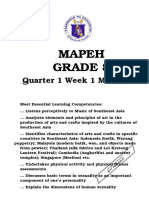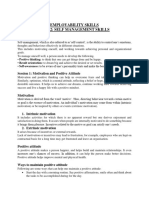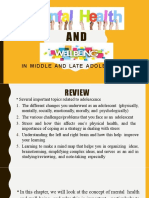0 ratings0% found this document useful (0 votes)
3 viewsSelf Management Skills
Self Management Skills
Uploaded by
epicnichiiCopyright:
© All Rights Reserved
Available Formats
Download as PDF, TXT or read online from Scribd
Self Management Skills
Self Management Skills
Uploaded by
epicnichii0 ratings0% found this document useful (0 votes)
3 views53 pagesCopyright
© © All Rights Reserved
Available Formats
PDF, TXT or read online from Scribd
Share this document
Did you find this document useful?
Is this content inappropriate?
Copyright:
© All Rights Reserved
Available Formats
Download as PDF, TXT or read online from Scribd
Download as pdf or txt
0 ratings0% found this document useful (0 votes)
3 views53 pagesSelf Management Skills
Self Management Skills
Uploaded by
epicnichiiCopyright:
© All Rights Reserved
Available Formats
Download as PDF, TXT or read online from Scribd
Download as pdf or txt
You are on page 1of 53
Throughout his illustrious career Sachin Tendulkar
maintained a strict fitness regimen to ensure peak physical
condition for his demanding sport. He adhered to a
disciplined workout routine, focusing on strength training,
flexibility, and cardiovascular exercises. Recognizing the
importance of nutrition in athletic performance, Tendulkar
followed a carefully curated diet plan. Tendulkar's
dedication to his craft was evident in his relentless practice
sessions. He invested countless hours honing his batting
skills, studying opponents' strategies, and analyzing his
own performance to continuously improve.
Despite his busy schedule as a professional cricketer, Tendulkar effectively
managed his time to balance cricket commitments with personal life and family
responsibilities. In high-pressure situations on the cricket field, Tendulkar
maintained remarkable emotional control and focus. He approached each game
with a calm and composed demeanor, channeling his nerves into positive energy
to deliver exceptional performances when it mattered most.
SELF MANAGEMENT SKILLS
• Do you come to class on time?
• Do you paying attention to
what others tell you?
• Do you obey teachers,
parents and elders?
• Do you work with discipline?
Self-management
• referred to as ‘self-control’, is the ability to control one’s
emotions, thoughts and behaviour effectively in different
situations.
• includes motivating oneself, and working towards achieving
personal and academic goals.
To manage oneself well, a person needs
to develop the following:
• Positive thinking: to think that one can get things done and be happy.
• Result orientation: to dream big and achieve the desired or set results.
• Self-awareness: to be aware of one’s personality traits and make the best out
of one’s strengths.
Session 1: Motivation and Positive Attitude
• “Optimism is the faith that leads to achievement. Nothing
can be done without hope and confidence.” — Helen Keller
• Motivation and positive thinking can help us overcome fears
and take up new challenges.
• Optimism, which is a mental attitude, reflecting a belief or
hope, can lead to positive and desirable outcomes.
• It helps us to achieve our dreams, continue working hard
towards achieving success and live a happy life with a
positive mindset.
Motivation
• Motivation is derived from the word ‘motive’.
• directing behaviour towards certain motive or goal is the
essence of motivation.
• An individual’s motivation may come from within (intrinsic
motivation) or be inspired by others or events (extrinsic
motivation).
Alice genuinely enjoys
Bob studies for the exam because
learning and is passionate
he wants to achieve a high grade
about the subject matter. She
to impress his parents and
finds the material fascinating
teachers. Bob is motivated by the
and derives satisfaction from
promise of praise, recognition, or
mastering new concepts and
tangible rewards, such as a cash
ideas. Alice feels a sense of
bonus or academic scholarship.
personal fulfillment and
While Bob may put in effort to
accomplishment when she
study, his motivation is contingent
understands complex topics.
upon the expectation of external
She study diligently, even
rewards or avoidance of negative
when there are no immediate
Intrinsic motivation
• no apparent reward but one derives enjoyment and
satisfaction in doing them.
• people are internally motivated to do something because it
brings them pleasure.
• feel what they are learning is significant or important.
Extrinsic motivation
• arises because of incentives or external rewards
• Lack of motivation or incentives may lead to frustration
• for example, employees who are kept on contractual basis
for a long time may get frustrated and leave an organisation.
Positive attitude
• makes a person happier, and helps build and maintain
relationships.
• increases one’s chances of success.
• it can help the person make better decisions.
• helps improve mental and physical health
• able to move forward than those with a negative attitude.
Ways to maintain positive attitude
• Start the day with a morning routine. Say positive
affirmations, smile often and think about the tasks to be
accomplished during the day.
• Feed the mind with positivity, read motivating books, listen
to music with uplifting lyrics, watch inspiring movies, etc.
• Be proactive. A proactive person decides how one must feel
regardless of what may be going around or what the day may
bring.
• Focus on constructive and positive things. Do not approach
life with ‘problems’. Approach it with ‘solutions’.
• Learn from failures. Think what could have been better and
work towards the goals.
• Learn to focus on the present. Negativity mostly stems out
from anxiety of the past and future events.
• Move towards your goals and dreams. Be cheerful and work
hard to achieve the dreams.
Some more techniques that can help you to
maintain a positive outlook in the long run.
• Physical exercise and fresh air
• Healthy diet
• Organise academic life
• Adequate sleep
• Holidays with family and friends
What is stress and how to manage it?
• Stress is a state of feeling upset, annoyed and hopeless.
• There are times when we feel nothing is working right, we
are not able to achieve our goals and feel hopeless.
• During such times, if we manage and control our emotions, it
helps us to sail through.
Ways to manage stress
• Stay positive and analyse what is going wrong in a certain
situation. Resolving the situation is easy once understood.
• Maintain an accomplishment sheet and enter even small
achievements.
• Keep your thoughts in present. Pondering over past issues makes
us feel upset and helpless.
• Talk to friends and family for comfort.
• Practise meditation and yoga.
• Whenever you feel negative thoughts are taking over, take a look
at your accomplishment sheet.
Managing stress effectively helps one
maintain a healthy work–life balance.
Session 2: Result Orientation
• a term used to describe a person’s ability to recognise what
results are important and the steps needed to be taken to
achieve them.
• result orientation describes an individual or organisation that
focusses on outcome rather than the process that has been
used to produce a product or deliver a service.
• An ideal employee needs to be proactive and result driven.
• The person must always take necessary steps to achieve the
set goals or targets.
How to become result oriented?
• Set clear goals
• Prepare an action plan - Each action, step or change should
include the following information:
• Use the right resources and tools
• Communicate with mentors and peers
• Make a calendar
• Work hard
Goal setting
• understand what we want, how to achieve it and how do we
measure our success.
how to define a goal?
• Identify what the goal is about
• How the goal would make a difference?
Use the acronym SMART to set goals
• S: Specific
• M: Measurable
• A: Action-oriented
• R: Realistic
• T: Timely
— Actions that I am already taking towards achieving this goal
— Actions that I am not currently taking but will take towards achieving this goal
— Actions that I am not currently taking and need help to achieve the goal
— People and places from whom I can get help to achieve the goal
Not a time bound goal: “I want to lose 10 kg someday.”
Time bound goal: “I want to lose 10kg in the next 6 months.”
Session 3: Self-awareness
• understanding one’s own needs, desires, habits, traits,
behaviours and feelings.
Steps towards self-awareness
• first step for practising self-awareness is gaining a greater
awareness of one’s emotions
• The second step to practising self-awareness is making a
habit of tracking one’s feelings.
• The third step for practising self-awareness is expanding
one’s practice to areas of life beyond the person’s feelings.
Personality and personality traits
• Personality is a cluster of thoughts, feelings and behaviours
that make a person unique and different from others.
• personality development is the development of an organised
pattern of behaviours and attitudes that makes a person
distinctive.
• Personality development occurs by the ongoing interaction of
temperament, character and environment. Culture also plays
an important role in shaping personalities.
FFM
• There are five parameters that describe an individual’s
personality.
• These five dimensions are also called the ‘Big Five Factors’
and the model is referred to as the ‘Five Factor Model’,
which is abbreviated as FFM
Common personality disorders
• Personality disorders involve long-term patterns of thoughts
and behaviour that are unhealthy and rigid.
• A personality disorder is a way of thinking, feeling and
behaving that deviates from worldly expectations and causes
distress, which lasts over time.
Cluster A: Suspicious
They mistrust others and are suspicious, even when there is no need to do so.
Varsha is a homemaker. A maid has been working
at her house for two years. Despite having CCTV
cameras installed at home, Varsha is always
suspicious about the maid. She follows her all the
time and keeps a tab on her movements. This
causes stress between Varsha and her maid.
• detached and aloof
• prone to introspection and fantasy
• little interest in forming personal relationships
• emotionally cold
Schizotypal personality disorder
● believes that they have unusual powers like influencing other people or
events with their thoughts.
● Often misinterpret behaviours. This causes them to have inappropriate
emotional responses.
● consistently avoids having intimate relationships.
Cluster B: Emotional and impulsive
Sunny is a student in a high school. Whenever he gets low
marks, he is depressed and fights with his friends. He, also,
does not try to learn from mistakes. His parents and teachers
have tried talking with him but he feels angry, worthless and
shouts at them
unstable moods and behaviours, which lead to unhealthy and unstable
relationships, emotional instability and feeling of worthlessness.
ANTI SOCIAL PERSONALITY DISORDER
• disregard social rules and obligations.
• irritating and aggressive, and act impulsively.
• lack guilt and fail to learn from experience.
• may lie, steal or abuse, and may also get
addicted to alcohol or drugs.
Borderline personality disorder
• lack a sense of self-worth
• experience feelings of emptiness and fears of abandonment.
• emotional instability, violent outbursts and impulsive behaviour
• Suicidal threats and acts of self harm are common in them
• difficulty in dealing with stressful events.
Histrionic personality disorder
• frequently try to gain more attention by being
overly dramatic.
• extremely sensitive to criticism or disapproval
• be easily influenced by others.
Narcissistic personality disorder
● believe that they are more important than
others.
● lack empathy for other people
● exaggerate their own achievements.
Cluster C: Anxious
feelings of worry, anxiety or fear, which have the potential to affect
one’s daily routine.
Shikha is an elderly woman. She stays with her family.
She has a habit of washing her hands at least 20 times
a day. Even after washing her hands, she feels they
are not clean, and continues rubbing or washing them.
Avoidant personality disorder
socially inept, unappealing or inferior, and constantly fear
being embarrassed, criticised or rejected.
They avoid meeting others and often experience feelings of
inadequacy, inferiority or unattractiveness.
Dependent personality disorder
• lack of self-confidence and an extra need to be
looked after.
• They need a lot of help in making everyday decisions
and surrender important life decisions to the care of
others.
• They are heavily dependent on other people for their
emotional and physical needs, and thus, usually, avoid
being alone.
Obsessive-compulsive personality
disorder
• strongly stick to rules and regulations.
• excessive concern with orderliness, perfectionism
and attention to details.
• They feel extremely uncomfortable when unable to
achieve perfection.
• They may even neglect personal relationships to
focus on making a project perfect.
Steps to overcome personality disorders
• Talk to someone. Most often, it helps to share your feelings.
• Look after your physical health. A healthy body can help you
maintain a healthy mind.
• Build confidence in your ability to handle difficult situations. •
• Engage in hobbies, such as music, dance and painting. These
have a therapeutic effect.
• Stay positive by choosing words like ‘challenges’ instead of
‘problems’.
explain the meaning of
personality.
describe basic
personality traits.
describe common
personality disorders
You might also like
- The House-Person-Tree Personality TestDocument10 pagesThe House-Person-Tree Personality Testelidabicaku9254100% (2)
- Personality Disorders and The Five Factor Model of Personality PDFDriveDocument459 pagesPersonality Disorders and The Five Factor Model of Personality PDFDrivePEKA SELANGOR100% (1)
- Managing People and OrganisationsDocument50 pagesManaging People and OrganisationsOmkar DesaiNo ratings yet
- Chapter 10 Personality Theory and MeasurementDocument11 pagesChapter 10 Personality Theory and MeasurementMaricris GatdulaNo ratings yet
- Self Awareness and Self Esteem PPT at Bec Doms Bagalkot MbaDocument33 pagesSelf Awareness and Self Esteem PPT at Bec Doms Bagalkot MbaBabasab Patil (Karrisatte)No ratings yet
- Ogl 360 FinalDocument19 pagesOgl 360 Finalapi-538756701No ratings yet
- Color PsychologyDocument5 pagesColor PsychologymmadhvanNo ratings yet
- Mapeh Grade 8: Quarter 1 Week 1 Module 1Document37 pagesMapeh Grade 8: Quarter 1 Week 1 Module 1Bayoyong Nhs100% (2)
- Self - Management SkillsDocument9 pagesSelf - Management SkillsRevati MenghaniNo ratings yet
- Self MGT SkillsDocument3 pagesSelf MGT SkillsTall ShadowsNo ratings yet
- 26840e7c8df5670f0d94341ea9829c55Document28 pages26840e7c8df5670f0d94341ea9829c55Manushree NayakNo ratings yet
- Homeroom Guidance WEEK 1Document18 pagesHomeroom Guidance WEEK 1Jessica AngeleoNo ratings yet
- Unit-2 Self Management SkillsDocument7 pagesUnit-2 Self Management SkillsSanah SayedNo ratings yet
- Self Management SkillsDocument7 pagesSelf Management SkillsharshNo ratings yet
- Lees 102Document16 pagesLees 102diptimayeerout278No ratings yet
- Fin Act2Document6 pagesFin Act2Dan Shadrach DapegNo ratings yet
- Attitude Lecture NotesDocument22 pagesAttitude Lecture Notesalice katenjeleNo ratings yet
- Mental Fitness PDFDocument9 pagesMental Fitness PDFOana Ab100% (1)
- Module 8 - College MindsetDocument17 pagesModule 8 - College MindsetMico VillanuevaNo ratings yet
- While Uneducated Birds and BeastsDocument26 pagesWhile Uneducated Birds and BeastsDaisyl BarrientosNo ratings yet
- Intrinsic MotivationDocument103 pagesIntrinsic MotivationCoconut GamerNo ratings yet
- Self-Management Skills: NtroductionDocument104 pagesSelf-Management Skills: NtroductionCoconut GamerNo ratings yet
- Health Education ReviewerDocument6 pagesHealth Education ReviewermariadiosalitacandelarioNo ratings yet
- Personality Development 2Document22 pagesPersonality Development 2sandhukiran12No ratings yet
- 02.2building Self Esteem and Self ConfidenceDocument32 pages02.2building Self Esteem and Self ConfidenceJoanna Mæ Nuñez SaysønNo ratings yet
- It Code 402 Unit 2 NotesDocument18 pagesIt Code 402 Unit 2 NotesPRIYANSHU SINGHNo ratings yet
- Lecture 1-3 FINAL TERM UNDS111Document36 pagesLecture 1-3 FINAL TERM UNDS111Jancee kye BarcemoNo ratings yet
- Self Management Skills-XIIDocument10 pagesSelf Management Skills-XIIatulsaxena968No ratings yet
- Mental Health PromotionDocument28 pagesMental Health PromotionJuleus Cesar CadacioNo ratings yet
- Self Management SkillsDocument29 pagesSelf Management Skills33 Siddhant JainNo ratings yet
- Lesson-2 Self RespectDocument34 pagesLesson-2 Self RespectMONCILLO EDMON, OCINANo ratings yet
- IX Emplobility Skills Combined Book PDFDocument66 pagesIX Emplobility Skills Combined Book PDFGaming ZeraoraNo ratings yet
- Self-Management Skills: Class IXDocument6 pagesSelf-Management Skills: Class IXYuvraj Rathore100% (1)
- Change and Grow Chapter 6Document30 pagesChange and Grow Chapter 6Mahendra Kachchhavah100% (1)
- Chapter 2 Personal DevelopmentDocument5 pagesChapter 2 Personal DevelopmentXieNo ratings yet
- Knowing OneselfDocument43 pagesKnowing Oneselfalyssa mae luceroNo ratings yet
- Unit Five-Self MangementDocument10 pagesUnit Five-Self MangementAbdirazak Omer Ahmed KhayrNo ratings yet
- Self Management SkillsDocument7 pagesSelf Management Skillsrmgokul78No ratings yet
- Homeroom GuidanceDocument16 pagesHomeroom GuidanceRakim PerezNo ratings yet
- Session 3 PART 1 SELF-MOTIVATION and Goal SettingsDocument140 pagesSession 3 PART 1 SELF-MOTIVATION and Goal SettingsARYAMAN GUPTANo ratings yet
- XII Self Management SkillsDocument49 pagesXII Self Management SkillsSahanaaNo ratings yet
- BMM Personal ChangeDocument39 pagesBMM Personal ChangePooja Shah100% (1)
- Lesson 3 ValuesDocument15 pagesLesson 3 ValuesBevan BalingitNo ratings yet
- Interpersonal Communication ExercisesDocument16 pagesInterpersonal Communication Exercisessuryaravi880No ratings yet
- AI PART A and PART B IMP (2) - 2Document7 pagesAI PART A and PART B IMP (2) - 2ರವಿ ಶ್ರೀಜಿತ್No ratings yet
- 4 - Attitude and MotivationDocument30 pages4 - Attitude and MotivationMa Marisa ArbalateNo ratings yet
- Educ103 Motivational Factors in LearningDocument10 pagesEduc103 Motivational Factors in LearningChristine Malasaga QuintanaNo ratings yet
- Chapters 12 - 13 UNDSDocument25 pagesChapters 12 - 13 UNDSCRUSH KITANo ratings yet
- Unit 2 Attitudes and MotivationDocument20 pagesUnit 2 Attitudes and Motivationteodoruunona609No ratings yet
- Self Management Class 10Document4 pagesSelf Management Class 10darkknightyt442No ratings yet
- Improving and Boosting Self Esteem: Presenter Name John Joshua A. Borac JL QuejaroDocument26 pagesImproving and Boosting Self Esteem: Presenter Name John Joshua A. Borac JL QuejaroUthalie Foliente AcidoNo ratings yet
- Self Management Skills Class 9Document3 pagesSelf Management Skills Class 9Rajesh kuamrNo ratings yet
- MotivationDocument28 pagesMotivationAbdullahNo ratings yet
- Chapter 1 HTH 558Document10 pagesChapter 1 HTH 558nadhirah zulfakarNo ratings yet
- Life Skill Training - Part TwoDocument56 pagesLife Skill Training - Part TwobekaluNo ratings yet
- Self Awareness, Psychology and Social RolesDocument64 pagesSelf Awareness, Psychology and Social RolesZarnigar AltafNo ratings yet
- Homeroom GuidanceDocument9 pagesHomeroom GuidanceMa. Elpidia Caridad TuazonNo ratings yet
- DA Building Self Image Manual-Part 1Document17 pagesDA Building Self Image Manual-Part 1Hikma HikmaNo ratings yet
- Psychosocial Preparedness EditedDocument21 pagesPsychosocial Preparedness EditedAre Em GeeNo ratings yet
- In Middle and Late AdolescenceDocument52 pagesIn Middle and Late AdolescenceDesire T. SamillanoNo ratings yet
- Class XII Self ManagementDocument4 pagesClass XII Self ManagementAlbert Jayant RajputNo ratings yet
- Introduction To PerdevDocument55 pagesIntroduction To PerdevKhinet Baron Lumakang100% (1)
- The Individual in An OrganizationDocument37 pagesThe Individual in An OrganizationnanaaduNo ratings yet
- Personality DevelopmentDocument22 pagesPersonality DevelopmentcyrusdeshmukhNo ratings yet
- Managing and Caring For The SelfDocument40 pagesManaging and Caring For The SelfJoshua CuarterosNo ratings yet
- Psych 162: Personality TestingDocument8 pagesPsych 162: Personality TestingSteffi PerillaNo ratings yet
- Automatic Writing As An Indicator...Document22 pagesAutomatic Writing As An Indicator...Eduardo AramayoNo ratings yet
- 0 - Andrei2015-Validity TEIQueDocument17 pages0 - Andrei2015-Validity TEIQueGita YolandaNo ratings yet
- Week3. Assignment in Human RelationsDocument3 pagesWeek3. Assignment in Human RelationsEdgie FabillarNo ratings yet
- Manual of Personality StylesDocument71 pagesManual of Personality StylesQuang Thọ100% (2)
- The Intentions Towards Infidelity Scale: January 2011Document9 pagesThe Intentions Towards Infidelity Scale: January 2011Maria ChiperiNo ratings yet
- Psychology 1st Canadian Edition 1616018271. PrintDocument877 pagesPsychology 1st Canadian Edition 1616018271. PrintMuskaan ChoudharyNo ratings yet
- 1 Introduction To Personality Theories-1Document35 pages1 Introduction To Personality Theories-1Prayl Hope NapanoNo ratings yet
- Correspondent Inference Theory and Weiner's ModelDocument6 pagesCorrespondent Inference Theory and Weiner's ModelManvi SirohiNo ratings yet
- Chapter 1 Schola Christi ChoiceDocument45 pagesChapter 1 Schola Christi ChoiceRonel DayoNo ratings yet
- Relationship Between MBTI and Career Success - Yu 2011Document6 pagesRelationship Between MBTI and Career Success - Yu 2011alanwilNo ratings yet
- Costa Mccrae 1995Document31 pagesCosta Mccrae 1995f100200164No ratings yet
- R15 EvangelistaDocument6 pagesR15 EvangelistaJoe EvangelistaNo ratings yet
- The Aims of Positive Psychology-: Affect, Negative Affect and Life SatisfactionDocument10 pagesThe Aims of Positive Psychology-: Affect, Negative Affect and Life SatisfactionAPOORVA PANDEYNo ratings yet
- Comprehensive Psychology: An Analysis of Resistance To Change Exposed in Individuals' Thoughts and BehaviorsDocument9 pagesComprehensive Psychology: An Analysis of Resistance To Change Exposed in Individuals' Thoughts and BehaviorsSiti Sarah Zalikha Binti Umar BakiNo ratings yet
- Motowidlo (1997) Individual Differences and Contextual PerformanceDocument15 pagesMotowidlo (1997) Individual Differences and Contextual PerformanceNicolas Mussuto RienziNo ratings yet
- Beier Young Villado 2018 Job Knowledge ObligatoriuDocument26 pagesBeier Young Villado 2018 Job Knowledge ObligatoriuDorina MastanNo ratings yet
- Attitude Notes For PostingDocument4 pagesAttitude Notes For PostingSteve Premier NaiveNo ratings yet
- Personality Belief Questionnaire Scoring KeyDocument1 pagePersonality Belief Questionnaire Scoring KeyKrystal100% (1)
- Extroverts and Introverts - 15aprDocument1 pageExtroverts and Introverts - 15aprasjakjsakaNo ratings yet
- Psycological Analysis of The Main Character'S Personality in Go Ask Alice ThesisDocument75 pagesPsycological Analysis of The Main Character'S Personality in Go Ask Alice ThesisMonyet unguNo ratings yet
- INTP PersonalityDocument35 pagesINTP PersonalityNguyen Duc DungNo ratings yet
- Smith Et Al. (2022) P. 16-31Document60 pagesSmith Et Al. (2022) P. 16-31Jaqueline CairesNo ratings yet
- Goodness of MeasurementDocument6 pagesGoodness of MeasurementVishal Sharma100% (2)

























































































